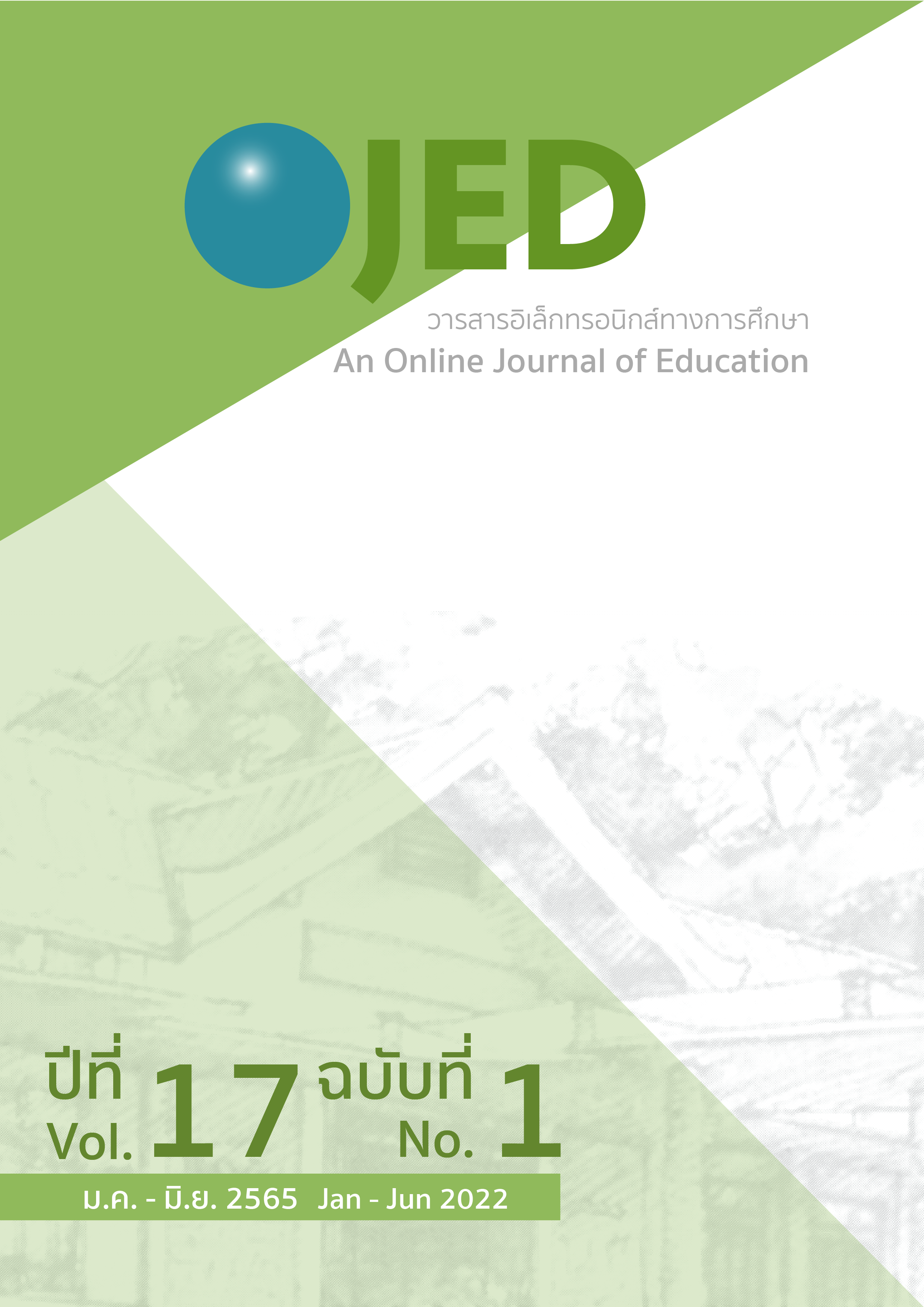The Effects of Communicative Language Teaching Activities through Social Media on the Speaking Ability of Bhutanese Students
DOI:
https://doi.org/10.14456/ojed.2022.14Keywords:
Communicative language teaching (CLT), speaking ability, secondary educationAbstract
This study aimed to study the effects of CLT activities through social media on the speaking ability of Bhutanese students and to find out the student’s perception towards CLT activities through social media. Thirty-two grade eight students were purposively selected for the study. A pretest was administered in the first week followed by ten weeks of treatment sessions. Students were subsequently administered a posttest and perception questionnaire. The quantitative results of the study revealed that the students’ posttest mean score in the English-speaking ability test was higher than their pretest mean score at a significant level of .05, indicating that their speaking ability improved significantly after receiving the treatment. The most developed aspects of speaking ability from the evaluation of their weekly speaking tasks posted to the class Facebook page were the improvement of vocabulary and communication strategy. Furthermore, the results obtained from the Likert questionnaire and open-ended questions on students’ perception towards the instruction revealed that the students held positive perceptions towards CLT activities through social media and students revealed that it enhances self-confidence, motivation, interaction, a possibility of learning from anywhere, and most importantly, eliminating speaking anxiety from learning speaking.
References
Alharbi, H. A. (2015). Improving Students' English Speaking Proficiency in Saudi Public Schools. International Journal of Instruction, 8(1), 105-116.
Ali, J. K. M., Shamsan, M. A., Guduru, R., & Yemmela, N. (2019). Attitudes of Saudi EFL learners towards speaking skills.
Alm, A. (2015). " Facebook" for Informal Language Learning: Perspectives from Tertiary Language Students. The EUROCALL Review, 23(2), 3-18.
Armstrong, T. (2009). Multiple intelligences in the classroom. Ascd.
Arndt, H. L., & Woore, R. (2018). Vocabulary learning from watching YouTube videos and reading blog posts. Language Learning & Technology, 22(3), 124-142.
Bikowski, D., & Kessler, G. (2002). Making the most of discussion boards in the ESL classroom. TESOL Journal, 11(3), 27-30.
Taufiqulloh, S. D. (2012). Designing Speaking Test. Eksplanasi, 4(8).
Dorji, J. (2017). Communicative language teaching as conceptualized by Bhutanese English as second language teachers. Indonesian EFL Journal, 3(1), 1-10.
English, C. (2011). Assessing speaking performance: Level A2. University of Cambridge.
Gyeltshen, D. (2018). The Use of Media (Videos) to Reduce ESL Students' Speaking Anxiety. Journal of Learning Innovations Walailak University, 4(2), 77-92.
Gyeltshen, D., & Chalermnirundorn, N. (2018). The Use of Media (Videos) to Reduce ESL Students' Speaking Anxiety. Journal of Learning Innovations Walailak University, 4(2), 77-92.
Harmer, J. (2015). The practice of English Language Teaching.–5th Edition–England. Pearson.
Hasan Dirjal, A., & Ghabanchi, Z. (2020). The Impact of Social Media Application in Promoting Speaking Skill of Iraqi University learners of English: A Skype-based Study. Arab World English Journal (AWEJ) Special Issue on the English Language in Iraqi Context.
Heldenbrand, B. (2003). Drama techniques in English language learning. Korea TESOL Journal, 6(1), 27-37.
Heriyanto, D. (2015). The effectiveness of using YouTube for vocabulary mastery. ETERNAL (English Teaching Journal), 6(1).
Humphreys, G., & Wyatt, M. (2014). Helping Vietnamese university learners to become more autonomous. ELT journal, 68(1), 52-63.
Hussin, R. A., Gani, S. A., & Muslem, A. (2020). The Use of Youtube Media Through Group Discussion in Teaching Speaking. English Education Journal, 11(1), 19-33.
Ilyas, M., & Putri, M. E. (2020). YouTube Channel: An Alternative Social Media to Enhance EFL Students’ Speaking Skill. J-SHMIC: Journal of English for Academic, 7(1), 77-87.
Kabilan, M. K., Ahmad, N., & Abidin, M. J. Z. (2010). Facebook: An online environment for learning of English in institutions of higher education?. The Internet and higher education, 13(4), 179-187.
Koran, S. (2015). The Role of Teachers in Developing Learners' Speaking Skill. 6th the international visible conference on educational studies and applied linguistics: book of proceedings.
Krish, P., & Wong, B. E. (2009). Malaysian learners and their perceptions towards online English language courses. Turkish Online Journal of Distance Education (TOJDE), 10(2).
LaPrairie, M. (2014). A case study of English-medium education in Bhutan Institute of Education. University of London.
Lear, E. L. (2014). Improving intelligibility: Guided reflective journals in action. Language Learning in Higher Education, 4(2), 343-363.
Littlewood, W. (2007). Communicative and task-based language teaching in East Asian classrooms. Language teaching, 40(3), 243.
Littlewood, W., William, L., & Swan, M. (1981). Communicative language teaching: An introduction. Cambridge university press.
Mitchell, K. (2012). A social tool: Why and how ESOL students use Facebook. Calico Journal, 29(3), 471-493.
Muna, M. S. (2011). Utilizing YouTube Videos to Enhance Students’ Speaking Skill.
Richards, J. C. (2005). Communicative language teaching today. SEAMEO Regional Language Centre Singapore.
Safitri, R. (2014). Improving the students’ English speaking skill in class XA of State Senior High School 1 Gamping through videos in the academic year of 2013/2014. [Undergraduate thesis]. Universitas Negeri Yogyakarta, Yogyakarta.
Savignon, S. J. (2008). Interpreting communicative language teaching: Contexts and concerns in teacher education. Yale University Press.
Shan, Y. (2019). An Empirical Study on Improving Speaking Skills of Students in Vocational Colleges Under MALL Environments. DEStech Transactions on Computer Science and Engineering (iccis).
Sharma, P., & Barrett, B. (2008). Blended learning: Using technology in and beyond the language classroom. Macmillan.
Terantino, J. M. (2013). Facebook comparison research: Faculty and student perceptions of social media for foreign language courses. In Computer-assisted foreign language teaching and learning: Technological advances (pp. 91-103). IGI Global.
Wongsa, M. (2018). Effects of drama-based activities and Facebook on Thai secondary school students’ english speaking skills, attitudes and motivation. University of Southern Queensland.
Yen, Y.-C., Hou, H.-T., & Chang, K. E. (2015). Applying role-playing strategy to enhance learners’ writing and speaking skills in EFL courses using Facebook and Skype as learning tools: A case study in Taiwan. Computer assisted language learning, 28(5), 383-406.
Downloads
Published
How to Cite
Issue
Section
License
Copyright (c) 2022 An Online Journal of Education

This work is licensed under a Creative Commons Attribution-NonCommercial-NoDerivatives 4.0 International License.




